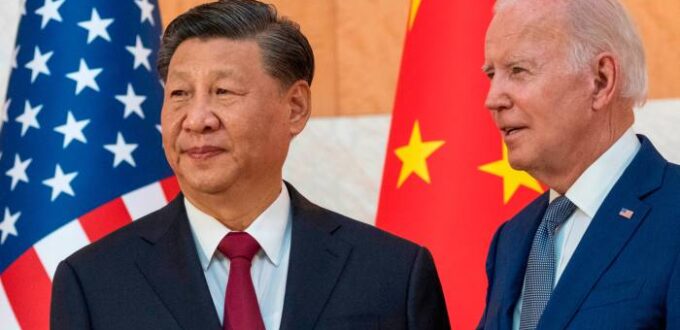Please use the sharing tools set up via the share button at the top or side of papers. Copying papers to partake with others is a breach ofFT.com T&C s and Brand Policy. [email protected] to buy fresh rights. Subscribers may partake up to 10 or 20 papers per month using the gift composition service.
The most positive aspect of Monday’s addresses between US chairman Joe Biden and his Chinese counterpart Xi Jinping is that they took place at all. Relations between the world’s two largest husbandry have been going upwardly with intimidatingspeed; according to some reports, Chinese officers were lately stonewalling over medications for a meeting between the two men on the sidelines of the G20 peak in Bali. But the world has formerly seen pressures over Ukraine erupt into a full-bloated irruption by Russia’s Vladimir Putin. A Chinese attack on Taiwan would be indeed more disastrous.
A shift in US- China relations has been needed by Beijing’s chauvinist and authoritarian turn under Xi over the once decade, its mortal rights abuses in Xinjiang, and its decreasingly oral calls for “ reunification ” with the tone- governing islet of Taiwan. But Beijing was infuriated by US House Speaker Nancy Pelosi’s visit to Taipei in August which urged a military show of strength by China and Biden has gone further than former chairpersons in pledging to defend the islet. Last month, the White House assessed strict import controls targeting China’s advanced semiconductor assiduity.
Washington’s determination to restrain Beijing’s intentions to surpass it as the world’s leading military and profitable power means further divorcing from China is ineluctable. But Washington must at the same time manage relations with Beijing with care. It should be guided by three principles that divorcing shouldn’t crash the global frugality; that war must be avoided; and that China’s co-operation is still demanded on a range of global issues.
There are some parallels with the US- Soviet conflict that took shape some times after the 1962 Cuban bullet extremity though the US and Soviet Union had formerly come to the point of nuclear war, and profitable ties were paltry. Conflict was embedded in part in erecting connections between functionaries at colorful situations. The US and China also each need to understand how the other thinks. It’s positive, also, that Biden and Xi agreed to designate officers to keep talking. A implicit path is open to further formative relations.
China could begin by restoring judicial co-operation on issues similar as repatriation, and on medicine enforcement, as well as bilateral climate change addresses, which Beijing suspended after Pelosi’s visit to Taiwan. Continuing service- to- service dispatches is also essential to collective confidence and security.
For its part, the US has some room for manoeuvre in how rigorously it implements its controls on semiconductors. It also has compass for restraint in its language over Taiwan. Biden took care on Monday to contend there would be no change to the “ One China ” policy, under which Washington acknowledges, but doesn’t plump , Beijing’s view that Taiwan is part of China. Biden has capacity to engage in some behind- the- scenes manoeuvring should the coming House Speaker seek to repeat Pelosi’s trip to Taiwan though the chairman has maintained that similar enterprise are Congress’s appanage .
In the longer term, Washington’s drive to decelerate Beijing’s accession of leading- edge service technologies should be combined with co-operation in areas of collective concern. These extend not just to the green transition, but also nuclear proliferation, epidemic forestallment, and debt restructuring for arising requests.
Biden claimed in Bali the US would “ continue to contend roundly ” with Beijing. But, as former Australian premier and China expert Kevin Rudd notes, competition between the two has been perilously “ unmanaged ”. To forestall a disastrous deterioration, the time has come for some careful operation.


No Comments Yet